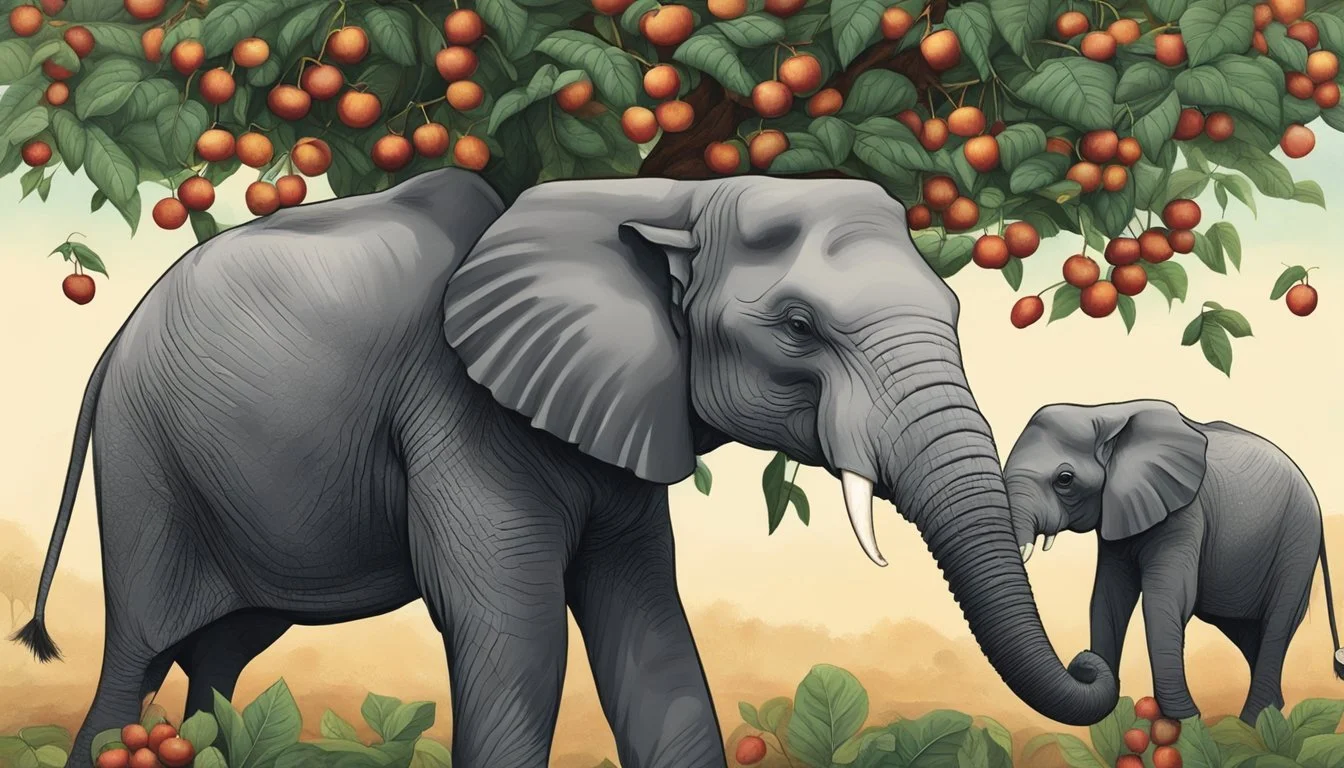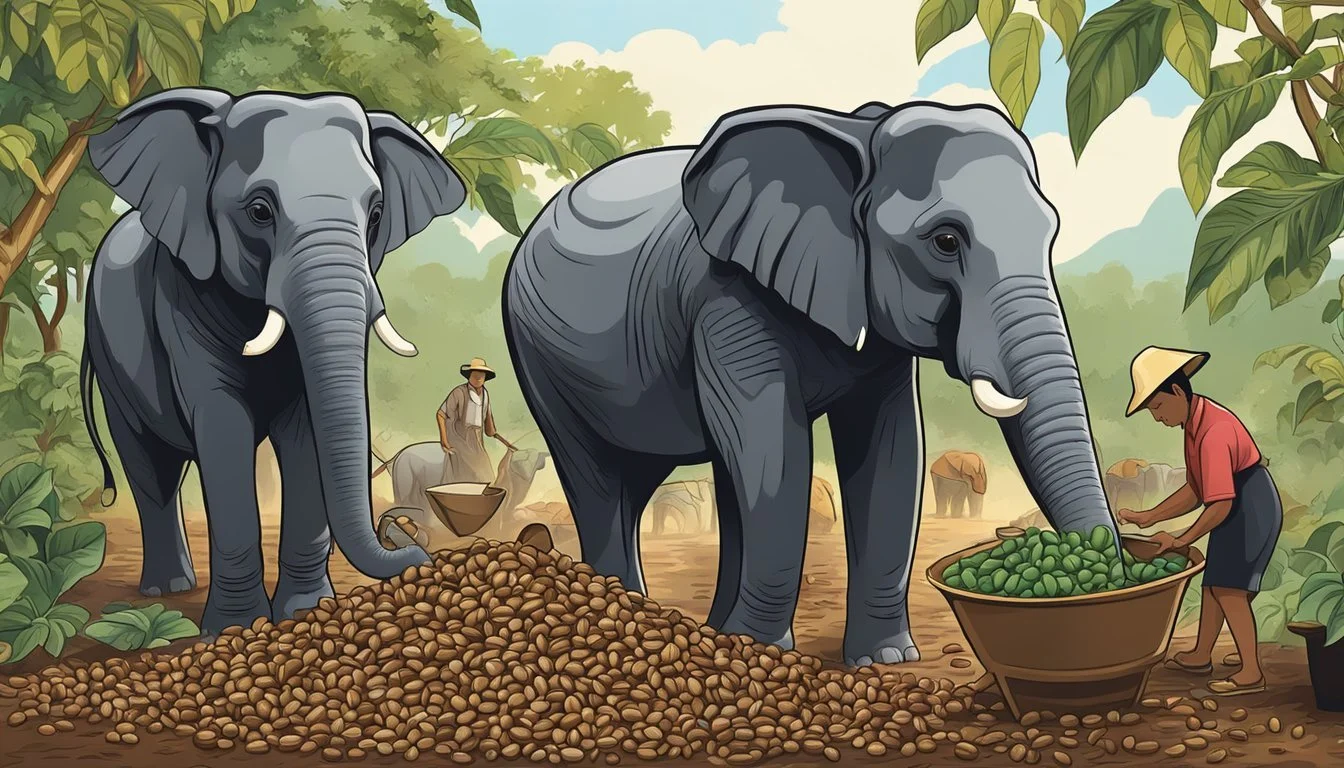Black Ivory Coffee
Unveiling the Exclusive Elephant-Processed Thai Brew
Black Ivory Coffee holds the distinction of being one of the world's most expensive coffees, revered for its exceptional and unique production process. Originating from the remote hills of Northern Thailand, this luxury coffee is produced in small batches with a method that is as distinctive as it is meticulous. The creation of Black Ivory Coffee involves Thai Arabica beans that are consumed and naturally refined by elephants in the region of Surin, making this coffee as rare as it is exotic.
The remarkable journey from bean to cup begins with the careful selection of high-quality Thai Arabica cherries, harvested from altitudes as lofty as 1500 meters. These cherries are then introduced to the elephants' diet, where they undergo a natural fermentation process within the elephants' digestive system. This step is crucial as it allows enzymes to break down proteins in the coffee cherries, a factor that reduces bitterness and imparts the coffee with a unique, complex flavor profile cherished by connoisseurs worldwide.
Due to the intensive nature of its production, which requires 33 kilograms of coffee cherries to produce just a single kilogram of roasted Black Ivory Coffee beans, the output remains limited, and the coffee is both exclusive and highly sought after. The resultant brew is said to offer a delicate, yet rich taste, devoid of the bitterness found in conventional coffee, and is served primarily in luxury hotels and select outlets across the globe.
Origins and History
Black Ivory Coffee represents a unique convergence of Thai agricultural practices and innovative coffee processing. The coffee's distinctiveness arises from its method of production involving elephants and its roots in Thailand's northern region.
Foundation of Black Ivory Coffee
Black Ivory Coffee Company Ltd started in the early 2010s after gaining inspiration from civet coffee. Blake Dinkin, the founder, invested over a decade of research and development to fine-tune a process that would be ethical and produce a coffee unlike any other. The brand established a partnership with the Golden Triangle Asian Elephant Foundation in Thailand to create a coffee that is not only distinctive in flavor but also contributes to the welfare of Asian elephants.
The company's production process involves Thai Arabica beans being consumed by elephants and then collected from their waste. The interaction of the coffee beans with the elephant's digestive enzymes imparts a unique flavor profile to the beans, which are then painstakingly harvested, cleaned, sun-dried, and roasted to create Black Ivory Coffee.
Role of the Golden Triangle
Located in the northern tip of Thailand, the Golden Triangle is an area historically known for its opium production. However, in recent years, initiatives like the one by Black Ivory Coffee have sought to repurpose this land for more noble endeavors. By including the local community and their elephants in the production process, the company fosters a sustainable and ethical operation. It also provides economic support to the people of the region and helps in the conservation of elephants.
The collaboration with the Golden Triangle Asian Elephant Foundation ensures that a portion of the proceeds from the sale of Black Ivory Coffee supports elephant care and welfare, providing benefits that extend beyond the enjoyment of the coffee itself. The production of Black Ivory Coffee not only brings to light the potential for unique agricultural products from this region but also showcases the possibility of agricultural transformation in a land once troubled by illicit trades.
The Unique Coffee Processing
Black Ivory Coffee undergoes a remarkable processing method, leveraging the digestive system of Thai elephants to create a unique flavor profile.
Elephant's Digestive Contribution
The elephants play a crucial role in the creation of Black Ivory Coffee. Select Thai Arabica coffee cherries at high altitudes are consumed by the elephants. As the cherries pass through the elephants' digestive tract, their gastric enzymes break down the cherry's protein. Protein is one of the main factors influencing the bitterness in coffee, therefore, this natural refinement process significantly impacts the final taste, reducing bitterness and creating a smooth, distinctive flavor.
Fermentation Process
During digestion, the coffee cherries undergo a natural fermentation as they are exposed to elephants' digestive enzymes. This process further develops the coffee's flavor, as the beans ferment within this unique environment. The two primary stages are:
Immersion: The beans are submerged in the elephants' digestive fluids, which helps in flavor absorption, resulting in a richer taste.
Extraction: After a period within the digestive system, the coffee beans are excreted and then thoroughly cleaned and prepared for roasting.
This meticulous process, from ingestion to extraction, contributes to Black Ivory Coffee's rarity and price. It not only defines the luxurious and unusual nature of the product but also underscores the artisanal art of coffee processing with a touch of nature’s ingenuity.
Elephant Welfare and Ethical Considerations
Black Ivory Coffee's production process not only seeks to create a luxurious coffee experience but also emphasizes the importance of ethical practices concerning elephant welfare and mahout communities.
Elephant Conservation Efforts
Black Ivory Coffee contributes to the welfare of Thai elephants involved in the coffee production process. The company supports various conservation efforts geared towards the Asian elephant, a species listed as Endangered on the IUCN Red List. The health care and living conditions of the elephants are a priority, ensuring that their involvement in the coffee processing contributes to their well-being.
Welfare: The Thai elephants' health, diet, and overall welfare are closely monitored. Ethical treatment includes proper nutrition, veterinary care, and ample space to thrive.
Conservation: A portion of the proceeds from Black Ivory Coffee sales is allocated to elephant conservation programs, which aim to provide a sanctuary and preserve the habitat of these majestic creatures.
Mahout Community Support
Mahouts, the caretakers and trainers of the elephants, play an integral role in maintaining the ethical standards of Black Ivory Coffee's production. The company's commitment extends to improving the livelihood of the mahout community in Thailand, recognizing their cultural and economic significance.
Employment: Providing employment opportunities for mahouts ensures they receive a fair wage that reflects the skill and dedication required to care for elephants.
Health Care and Training: They are offered specialized training and resources for the ethical treatment of elephants, as well as access to health care services.
Through responsible practices, Black Ivory Coffee aims to uphold a symbiotic relationship between the luxury coffee market, elephant conservation, and the mahout communities, ensuring a positive impact on all entities involved.
Culinary Profile
Black Ivory Coffee is acclaimed for its distinctive culinary profile, which arises from its exceptional processing method involving Thai elephants. It's revered for its flavor complexities and how it stands out among luxury coffees.
Flavor Characteristics
Black Ivory Coffee's flavor profile is remarkably smooth with almost no bitterness, a characteristic that distinguishes it from other coffees. It boasts subtle hints of chocolate and a mix of spices, which contribute to its rich taste. Notes of malt are also evident, adding to its unique and refined flavor spectrum. The fermentation process inside the elephants' digestive system breaks down the coffee's proteins, which often cause bitterness, hence its mild nature.
Comparison to Other Luxury Coffees
When compared to other luxury coffees like Kopi Luwak, Black Ivory Coffee presents a different approach to animal-processed coffee beans. Both are processed through a digestion method which imparts unique flavors, but Black Ivory Coffee is noted for its ethical production and higher exclusivity. While Kopi Luwak originates from Indonesia and involves civet cats, Black Ivory Coffee is a product of Thai elephants, which leads to differences in taste and production process. The latter is known as elephant dung coffee and is prized for its scarcity and ethical processing, offering a luxury experience that resonates well with connoisseurs.
Bean Selection and Preparation
In the crafting of Black Ivory Coffee, meticulous attention is paid to bean selection and preparation to ensure the exquisite experience this rare coffee offers.
Thai Arabica Beans
The foundation of Black Ivory Coffee is the Thai Arabica beans. These beans are sourced from high altitudes—as high as 1,500 meters—in Thailand. The cherries are specifically hand-picked to maintain quality, ensuring only the finest are used for the subsequent steps.
Roasting and Hand-Picking
After selection, the beans go through a roasting process which is tailored to highlight their unique flavor profiles. The roasting is monitored carefully to develop the desired taste, without overshadowing the natural subtleties. Subsequently, a further hand-picking procedure is undertaken to ensure that only the best roasted beans make it through to the final product.
Consumption Experience
When indulging in Black Ivory Coffee, consumers are not just having a cup of coffee; they are partaking in a luxurious experience steeped in a unique production process. This specialty coffee undergoes a natural refinement by Thai elephants, a method that is as unconventional as it is elaborate, contributing to the coffee’s exclusivity and distinctive flavor profile.
Tasting Notes: The coffee presents a smooth and rich taste, with noted hints of chocolate, tamarind, and a touch of grass, which can be attributed to the elephants' digestive enzymes that break down the protein in coffee cherries. These enzymes reduce bitterness, creating a distinctive cup that stands apart from conventional coffee.
Steeping Time: Immersion for 4-5 minutes is ideal
Settling: Allow the coffee to rest for an additional 2-3 minutes
By following this precise method, the consumer can ensure the flavors are fully realized. The absence of bitterness typically associated with coffee delivers a unique sensory experience, which is enhanced by the rarity and narrative behind its production.
Black Ivory Coffee, the luxury product it is, consistently draws those who appreciate not just a high-quality beverage but also the craftsmanship involved in its creation. Although this specialty coffee comes at a premium, the extraordinary process and the unmatched consumption experience justify the value to enthusiasts and connoisseurs alike.
Distribution and Availability
Black Ivory Coffee is among the rarest coffees globally, with its availability tightly controlled and predominantly allocated to luxury hospitality establishments. It is recognized for its distinctive production method involving Thai elephants, which contributes to both its scarcity and exclusivity.
Global Reach and Exclusivity
Five-star hotels and select luxury resorts are the chief recipients of Black Ivory Coffee due to the product's limited production volume. These establishments often feature Black Ivory Coffee as a premium offering, reinforcing their status as destinations for exclusive gourmet experiences. Private consumption is facilitated on a minimal basis, typically through direct purchase from the producer, maintaining the coffee's position as a luxury good.
Primary Market: Elite accommodation providers
Secondary Market: Specialty orders by gourmet roasters and individuals
Purchase and Price Points
The price of Black Ivory Coffee is reflective of its status as the world's rarest coffee. With a minute annual production in comparison to mainstream offerings, the cost is significantly high, which underscores its position as an expensive, one-of-a-kind sensory encounter. Buyers can anticipate a luxury price tag when seeking to enjoy this coffee outside the confines of the affiliated five-star hotels.
Availability for Purchase: Limited direct sales
Price Range: Premium tier due to rarity and unique processing
Cultural and Economic Impact
Black Ivory Coffee, with its distinctive production method involving elephants, has brought a unique cultural significance and economic influence to Thailand, particularly to regions like Surin Province where the coffee is produced. This artisanal coffee has provided a novel attraction, integrating traditional Thai elements with a luxury experience that appeals to a global market.
Surin Province, known for its association with elephants, has seen a boost in its local economy thanks to Black Ivory Coffee. The economic benefits stretch from the employment of locals to the use of elephants in an ethical and sustainable manner, which also supports their welfare.
In Northern Thailand, where the coffee company operates, the rare coffee has become synonymous with the high-end tourism of the area, especially in luxury establishments like the Anantara Golden Triangle. This exclusivity has increased international interest, not only in the coffee itself but also in the region's cultural practices surrounding elephant care.
Chiang Saen, often mistaken as the production area for Black Ivory Coffee, nevertheless benefits from the proximity to the brand's narrative. As the coffee garners attention, so do nearby locales, which can lead to increased tourism and global recognition.
Furthermore, there are initiatives to involve high school students in the process, providing educational opportunities and fostering a new generation that understands the balance between cultural tradition, animal ethics, and modern business practices. These educational programs aim to empower local youth with skills and knowledge that can lead to future economic development and conservation efforts.
By embracing the unique aspects of Black Ivory Coffee, Thailand has developed a product that resonates with cultural identity and promises positive economic outcomes for various stakeholders involved in its production and distribution.
Health and Nutritional Information
In discussing the health and nutritional aspects of Black Ivory Coffee, it is pertinent to focus on its caffeine and antioxidant profiles, as well as the unique health benefits provided by the digestive enzymes of elephants.
Caffeine and Antioxidant Content
Black Ivory Coffee, as a variant of Arabica beans, typically contains less caffeine compared to Robusta beans. The caffeine content in Arabica generally ranges from 0.8% to 1.4% by weight. As antioxidants go, Arabica coffee beans are rich in compounds such as chlorogenic acids, which are known to confer numerous health benefits, including inflammation reduction and neutralizing free radicals.
Digestive Enzymes and Health Benefits
During the unique processing of Black Ivory Coffee, the elephants' digestive enzymes assist in breaking down proteins in the coffee cherries. It is hypothesized by researchers that proteins can be a source of bitterness when present in high amounts in coffee. Thus, their breakdown may contribute to the smooth taste profile for which Black Ivory Coffee is famed. Health benefits may arise from the modification of the protein structure by these enzymes, potentially reducing the bitterness and improving the overall digestibility of the coffee. These enzymes may also play a role in enhancing the bioavailability of certain compounds, although specific health claims require further scientific validation.
Brewing Techniques and Best Practices
When brewing Black Ivory Coffee, one should follow specific techniques and practices to ensure the unique flavors are fully captured. Coffee connoisseurs recommend using whole beans for optimal freshness and grinding them just before brewing.
Grinding:
Coarseness: A medium grind is suitable as it allows proper extraction without over-steeping.
Consistency: Aim for uniform ground size to avoid an uneven brew.
Quantity:
Proportion: About 10 grams of coffee per 180 milliliters of water is recommended.
Water Quality and Temperature:
Water should be clean and filtered. Use water just off the boil, approximately 195-205°F (90-96°C), to avoid burning the coffee.
Method: The Thai "tubruk" style, involving pouring boiling water directly onto the grounds, is commonly used.
Duration: Allow the coffee to steep for 4-5 minutes.
Steeping:
After adding water to the grounds, let the coffee steep without stirring.
Once steeping is done, a natural sediment should form at the bottom of the vessel.
Fermentation Process:
Black Ivory Coffee undergoes a natural fermentation process within the elephants' digestive system, which is crucial to the bean's final flavor profile.
Artisanal Process:
This boutique coffee requires careful handling throughout the production process to maintain its luxurious quality.
To fully enjoy Black Ivory Coffee's sophisticated taste, these brewing techniques and best practices are essential. Each step is vital to highlight the coffee’s low-acidic nature and delicate notes that result from its passage through the elephants.






